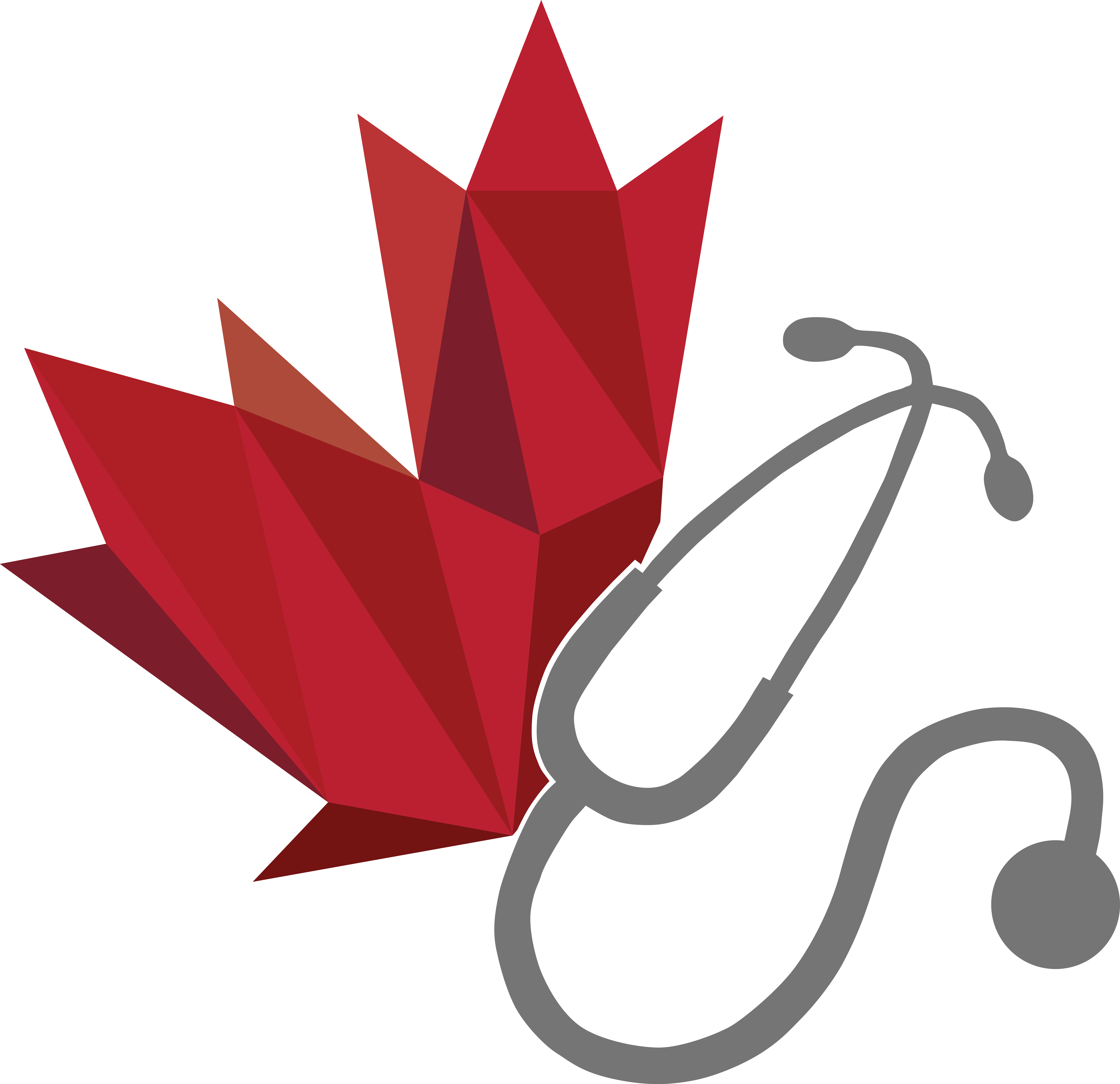MDs of Global Health
MDs of Global Health is a new national initiative spearheaded by the National Officer of Global Health Education and the Global Health Education Committee. It is a collection of portraits and interviews of Canadian physicians dedicated to global health, inspired by “Humans of New York”. We are hoping that this initiative will inspire and engage medical students in learning more about careers and projects they can take on in global health. Each physician has also provided their contact information if you would like to learn more about their experiences or to seek advice on global health involvement.
Project Lead & Global Health Education Committee Chair: National Officer of Global Health Education - Farnaz Javadian (University of British Columbia)
Global Health Education Committee Members:
- Kiruthika Baskaran (University of Toronto)
- Khalidha Nasiri (University of Western Ontario)
- Nguyet (Na) Nguyen (Memorial University of Newfoundland)
- Divya Santhanam (University of Western Ontario)
- Caleb Sypkes (University of Ottawa)
If you would like to learn more about the MDs of Global Health initiative or have any questions, please contact the CFMS National Officer of Global Health Education, Farnaz Javadian, at [email protected].
-
Dr. Sarah Gander, Pediatrician, President of the Social Pediatrics Section of the Canadian Pediatrics Society
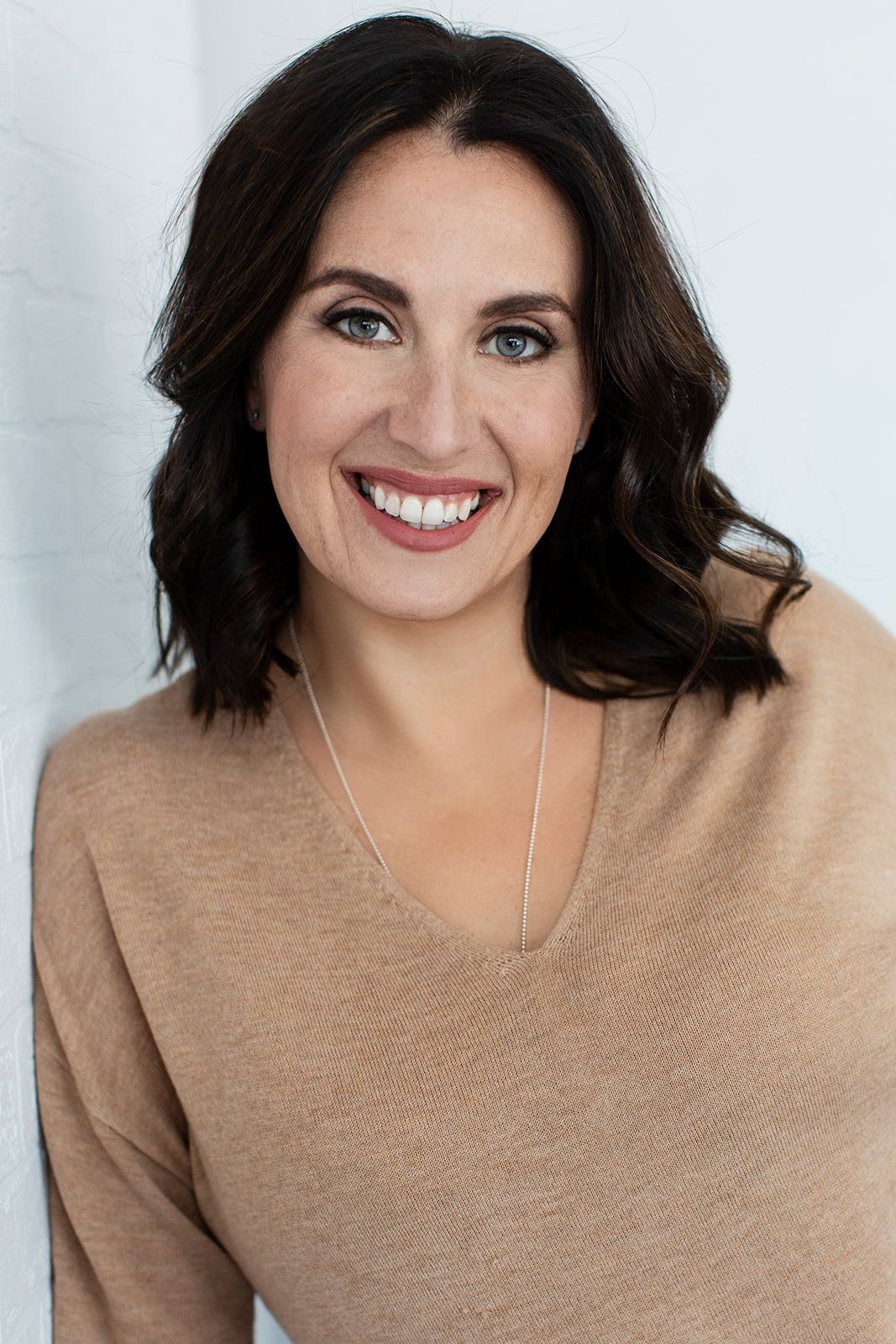
1. What is your specialty and where are you currently working?
I am a General Pediatrican and the Clinical and Academic Department Head of Pediatrics in Saint John, NB, Canada. I am also the current President of the Social Pediatrics Section of the Canadian Pediatrics Society and the NB Chair of Health Providers against Poverty.
2. What made you decide to get involved in global health and what sort of initiatives/projects have you taken on?
I am fascinated by population and public health. I basically just love people and am captivated by how they live and spend their lives. I have had some international experiences that have continued to trigger my interest and then most recently at home where the social determinants play out locally. I like complex problems and working through how to solve them and present workable solutions. One of my favorite sayings is “everything is figureout-able”. Most recently I have worked to design Case management programs for mothers who disclose drinking alcohol and using drugs during pregnancy in an effort to break cycles of generational poverty. I also do research and program development in Social Pediatrics, which is the community care approach of children living in difficult living circumstances guided by the philosophy of the UN Convention of the Child, giving children a voice.
3.How has your global health experience contributed to your career path/day-to-day work?
Perspective, compassion, global understanding of our impact and role in the UN sustainable goals. On a very practical level, we are so blessed to largely live in a country with accessible health care; it wasn’t until I worked in Zimbabwe where I saw children die from malnutrition, communicable disease, etc. that I realized this blessing. It made me appreciate where we live but also have a keen clinical eye for the “sick” versus “not sick” child.
4. What advice do you have for students interested in global health?
Just do it. Be careful and smart but do not let fear or discomfort stop you. Be humble, always listen to the first voice (ie. Those living it!) and be a sponge for all the learning.
5. As we are hoping that the MDs of Global Health national initiative will inspire medical students across the country to become involved in global health, would you like students to be able to contact you if they are interested in learning more about your experiences? If so, what would be the best way to get in contact with you?
Absolutely. My email is [email protected]
-
Dr. Dawn Howse, Family Physician, Hospitalist, & General Practice Oncologist, The Salvation Army Mission Hospitals
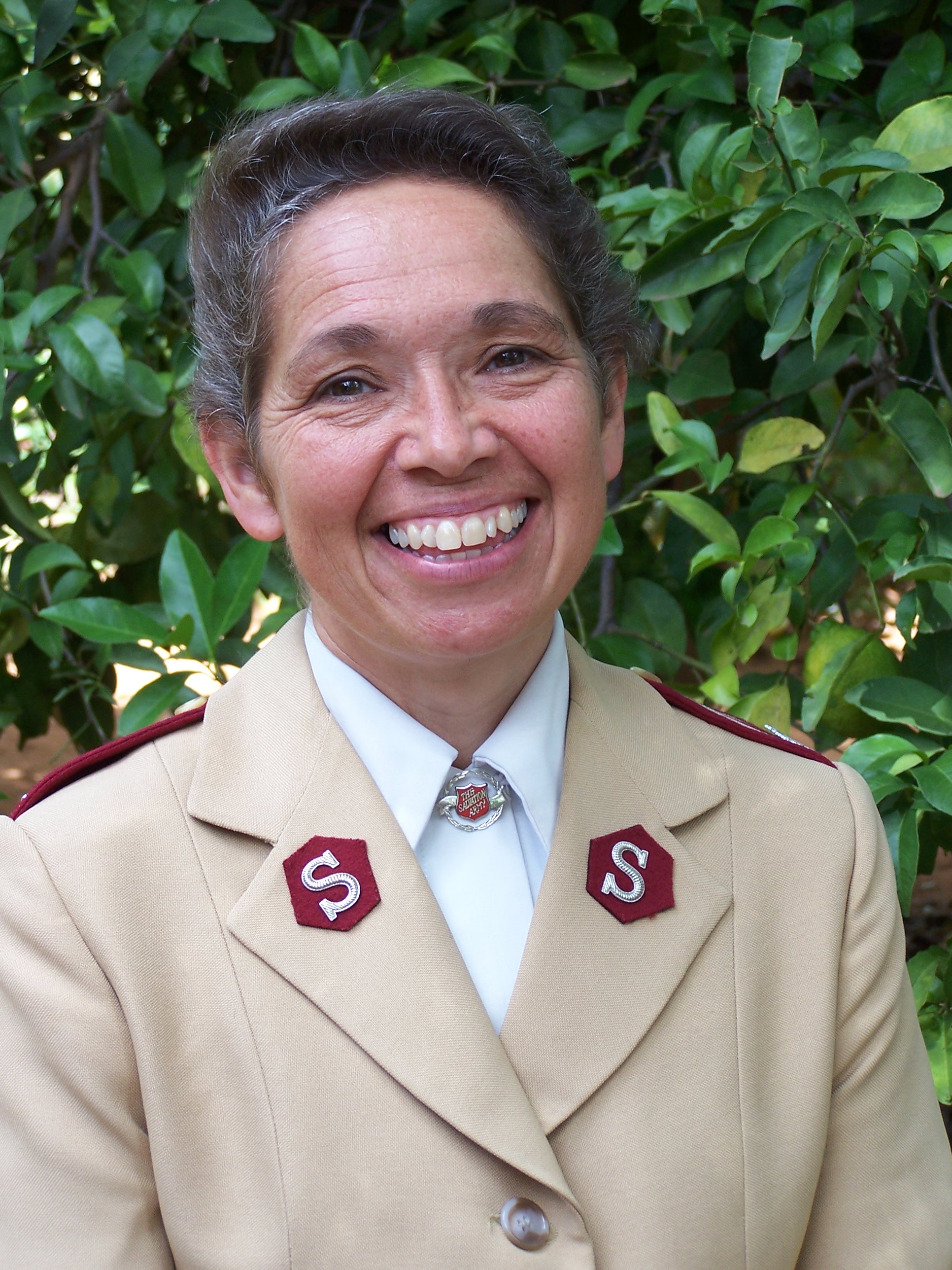
1. What is your specialty and where are you currently working?
I am a Family Practitioner, Hospitalist, and GPO (General Practice Oncologist) in Carbonear General Hospital.
2. What made you decide to get involved in global health and what sort of initiatives/projects have you taken on?
I have been drawn to the heart of Africa since my early teens. The Salvation Army provided the opportunity to serve at two of its Mission Hospitals, in Zimbabwe, from 1988 to 2008. I was sent to Liverpool, UK, to do the Diploma in Tropical Medicine and Hygiene course prior to my service.
While in Zimbabwe, I worked with a team of 3 or 4 doctors at Howard Hospital, for four years, gaining Surgical and Obstetrical skills, and participating in the projects to diagnose and manage/treat the epidemic of TB and HIV/AIDS that became so prevalent in those 20 years.
The next 16 years saw me as the mostly solo physician for a 100-bed hospital serving 40,000 people in the south of the country. At the peak of the above epidemic, we were diagnosing 350 new TB cases per year, half of them sputum positive, and battling HIV/AIDS prevalent in 30% of our pregnant women. We had an excellent team of volunteer community workers visiting patients at home, nursing and paramedical teams going out into communities to dispense the antiretrovirals, and counsellors available to assist people in gaining the courage to be tested, and to be open in encouraging others to do the same. Much of the funding came from NGOs assisting the Mission Hospitals.
Teams of volunteers went out into the mining areas to teach about condom usage and provide free condoms in public areas. There have been positive results that continue even now, despite political and economic challenges.
During those 16 years, I served on the Board of ZACH, the Zimbabwe Association of Church Hospitals, helping to guide our 125 Mission Hospitals with their individual programs, projects, funding, medicine importation, and relationship with the government’s Ministry of Health.
3.How has your global health experience contributed to your career path/day-to-day work?
I have gained a great respect for workers at all levels of health provision, even if all we have is hot water to wash the floors. I have learned that on-the-job training can work, from reading lab slides to diagnose malaria, TB or cryptococcal meningitis to developing X-rays or doing Caesarean Sections! I have learned a lot in working together with a hospital management team in how to best manage with limited resources, and how important transparency and accountability can be. I have learned a little in writing project proposals. I have especially learned how important our IMGs (International Medical Graduates) are to the health of our Carbonear Hospital and to our province, as I was one in Zimbabwe. I value the opportunity to be a bridge in obtaining their services and the responsibility and privilege of monitoring and assessing their progress toward full licensure.
4. What advice do you have for students interested in global health?
Be prepared to listen and to learn. As I was told, “For the first year, keep your mouth shut and your ears open.” Be humble. Do not scoff at the beliefs of a new culture; there may have been good reasons for them. Not all of modern medicine is a perfect or affordable fit. Become “comfortable” with using your senses, including common sense. You may have to make diagnoses and act upon your learned wisdom without the benefit of lab or X-ray backup. When I left Canada in 1988, the first CT scanner was coming to St. John’s. I saw no CT scans until I returned in 2008! (other than in journals). Do a tropical medicine course.
5. As we are hoping that the MDs of Global Health national initiative will inspire medical students across the country to become involved in global health, would you like students to be able to contact you if they are interested in learning more about your experiences? If so, what would be the best way to get in contact with you?
Certainly. E-mail [email protected] , or contact me through Carbonear General Hospital.
-
Dr. Patricia Livingston, Anesthesiologist and Medical Director of Global Health in the Dalhousie Dept. of Anesthesia, Pain Management & Perioperative Medicine
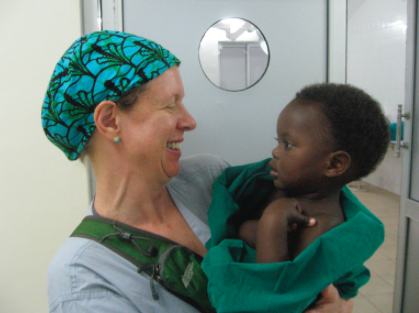
1. What is your specialty and where are you currently working?
Department of Anesthesia, Pain Management and Perioperative Medicine at Dalhousie University
2. What made you decide to get involved in global health and what sort of initiatives/projects have you taken on?
I got involved to try to make a contribution where it might be needed.
Initiatives I have taken on:
- Curriculum development for anesthesia residency program in Rwanda
- Establishing a multi-disciplinary simulation centre in Rwanda
- Developing the Teaching and Learning Course for Medical Professionals
- Creating an elective for Rwandan anesthesia residents to train at Dalhousie University
- Creating a global health elective for Dalhousie anesthesia residents to train in Rwanda
- Establishing the first anesthesia global health fellowship in Canada
- Developing the Vital Anesthesia Simulation Training (VAST) Course – a 3-day interprofessional simulation- based course for strengthening team management of the most common medical and surgical emergencies encountered by healthcare providers in low-resource settings
- None of this was done without collaboration and partnership from many others.
3.How has your global health experience contributed to your career path/day-to-day work?
This has been enormously rewarding. I celebrate the success of others. My own teaching skills and understanding of the world have grown. I’ve met an inspiring group of people along the way.
4. What advice do you have for students interested in global health?
Follow your passion and keep your spending modest so you have time and resources to dedicate to others.
-
Dr. Russell Dawe, Family Physician, Founder and Director of the MUN Care of Underserved Populations Enhanced Skills Program
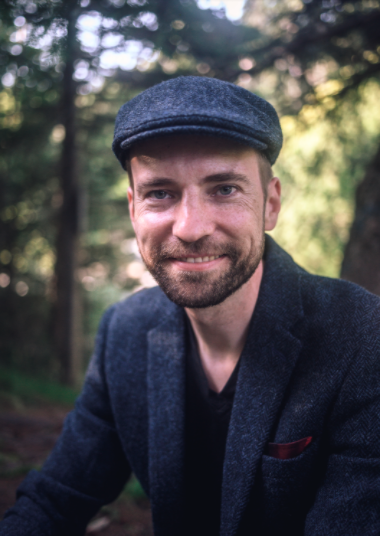
1. What is your specialty and where are you currently working?
I am a family physician. Clinically, I work at the Family Practice Unit at our Health Sciences Centre, which is an academic family medicine clinic with residents and medical students. I also work at the L.A. Miller Centre one day per week as a palliative care consultant. In addition to my clinical work, I do research with an emphasis on topics relevant to health equity, and I direct Memorial’s enhanced skills program for family physicians seeking additional training in the Care of Underserved Populations.
2. What made you decide to get involved in global health and what sort of initiatives/projects have you taken on?
My motivation to study medicine comes from a passion for social justice. I see a need for health equity in my home community, province, country and world. As a result, I value the opportunity to work with a variety of partners to advocate for sustainable change in all of those contexts.
I’m currently doing patient-oriented research in Indigenous health, in addition to my research in medical education for the care of underserved populations. I work with other academic institutions internationally to conduct program evaluation, in order to strengthen medical education in low and middle-income countries, where so many of our international colleagues are doing such innovative work.
My biggest project in the past few years has been creating and directing our Care of Underserved Populations Enhanced Skills Program for graduating family medicine residents and family physicians in practice. This has given me the opportunity to network with inner city providers in St. John’s, Indigenous communities and practitioners in Labrador, and International partners in Nepal and Uganda to create a program that will equip practitioners who want a career in health equity. I also co-chair our faculty of medicine’s working group for social accountability and supervise medical students and family medicine residents who undertake research in the care of underserved populations.
On a national and international level, I have been delighted to participate in the CFPC’s Besrour Centre. I co-chair the scientific committee for this annual forum, and have enjoyed collaborating with national and international partners from this institution in our efforts to advance family medicine globally as a foundational stepping stone towards universal health coverage. Finally, I volunteer with Academics Without Borders and sit on the board of directors for Global Familymed Foundation, as two non-governmental organizations whose mandates and activities overlap significantly with my own.
3.How has your global health experience contributed to your career path/day-to-day work?
When I first got into medicine I thought global health meant providing clinical service in a low or middle-income country. However, my first two international trips showed me ways that I could work with my international partners in areas of education, research, and program evaluation. I have since found a number of wonderful opportunities to collaborate with physicians and leaders internationally to advocate for sustainable change upstream in their healthcare systems. These collaborations strengthen our own system as well and I find we accomplish more together than working in silos. I have learned a lot from colleagues and mentors (non-physicians and physicians alike), and I consider myself truly fortunate to work with the inspiring colleagues I have met and learned from.
4. What advice do you have for students interested in global health?
We do not know what we do not know. Begin from a position of cultural humility, and find mentors and a broad perspective of authors you can learn from. There is no cookie-cutter approach to a career in global health, but there are important principles to be aware of and golden opportunities you don’t want to miss. Primum non nocere: beware of ‘voluntourism’ and the potential for negative impacts that can come from misguided good intentions. I have learned a great deal from my community health colleagues. Additionally, I recommend a more inclusive view of global health to include local/domestic matters (which I call “care of underserved populations”) in addition to the global issues. In this context, I have found Indigenous health to be a rich and compelling field with some of the wisest community partners I could ever imagine.
5. As we are hoping that the MDs of Global Health national initiative will inspire medical students across the country to become involved in global health, would you like students to be able to contact you if they are interested in learning more about your experiences? If so, what would be the best way to get in contact with you?
I can best be reached via email at: [email protected]
Additionally, my Twitter is: @russell_dawe
Our new Care of Underserved Populations Facebook page will be producing a broad range of related content at: @CUPMUN
-
Dr. Melanie van Soeren, Family Physician, MUN Care of Underserved Populations Program, Downtown Healthcare Collaborative
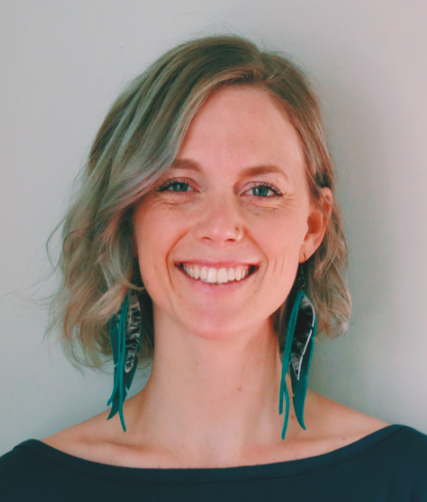
1. What is your specialty and where are you currently working?
I am a family physician and am currently primarily based in St. John’s, NL. I completed my family medicine residency through Memorial University of Newfoundland (MUN) in the Nunafam program, and subsequently was the first fellow in MUN’s Care of Underserved Populations (CUP) program. This program provides learners with an opportunity to develop skills in addressing social determinants of health both in the clinical setting and through upstream advocacy, working in the areas of research and policy development to benefit traditionally underserved groups, as well as capacity building and partnership in an international context.
In St. John’s, I work as a part of the Downtown Healthcare Collaborative and my time is shared between several different inner-city sites where I provide full scope primary care. I am privileged to work alongside a phenomenal team of physicians, nurse practitioners, registered nurses, social workers, case workers and many others who all come together to provide low-barriers, anti-oppressive care. I am also part of a family medicine low-risk obstetrics group.
My other home is Vancouver, BC and I locum as often as I can with the amazing PHS healthcare team in Vancouver’s Downtown Eastside.
I am also honoured to be involved in patient-oriented research into the cultural and health needs of Innu of Sheshatshiu and end-of-life [care], and am a co-investigator in an ongoing research project. I am also working on projects looking into the health impacts of reconciliation, and poverty interventions in primary care.
2. What made you decide to get involved in global health and what sort of initiatives/projects have you taken on?
My interest in global health stemmed from a desire to incorporate social activism into my career and to contribute to work aimed at decreasing inequities locally and globally.
I have been involved in short term experiences in global health (STEGH) and while I have personally benefited from these experiences through gaining new medical knowledge, expanding my awareness of global health issues, and improved clinical problem solving, particularly in low-resource settings, I’m also very aware that there is no evidence that these sorts of experiences have been shown to have long-term beneficial impacts on health.
There is better evidence for long-term sustainable projects focusing on partnership, and it is towards this direction that I am orienting my global health contributions. [Earlier this year], I [was] in the community of Amppipal, in the hilly region of Nepal where I [was] for the better part of a month. This was my second visit to this community; I spent one month working here in 2018 as a fellow with the CUP program. As a part of a collaborative partnership between the Patan Academy of Health Sciences (PAHS) and the organization Academics Without Borders (AWB), Canadian rural physicians are placed in rural district hospitals to support development and maintenance of the PAHS’ medical students’ rural rotation.
I see an incredibly important role for capacity building through partnership and reciprocity in global health initiatives. I do not at this time have any intention to work clinically in an international setting. There are many situations wherein clinical involvement from international groups can be appropriate; however, there can be a risk of developing dependency resulting in a lack of sustainability.
3.How has your global health experience contributed to your career path/day-to-day work?
We know from research in this area that medical learners who have global health experiences are more likely to orient their careers in a direction to serve marginalized communities locally. This has absolutely been the case for me; the more that I learned about health inequities, and the roots of the causes of the social determinants of health globally, the more I became aware of these challenges locally.
I am also involved with the Besrour Centre; this is a group that is working to promote primary care globally through advancing medical education, fostering research, and contributing to efforts to advance social accountability through international partnerships. Though I was always interested in pursuing family medicine, learning that health systems oriented around primary care are more equitable solidified my passion for the discipline. Advocacy around access to quality primary care is a global issue and one that I am privileged to be working on alongside incredible mentors in the field.
4. What advice do you have for students interested in global health?
Embarking on work with underserved populations, whether locally or globally, inherently will present us with situations in which strong power dynamics are at play. It’s so crucial to continue learning about our position of privilege as individuals in the healthcare profession, and the other forms of power we may carry, and how these aspects of our identity inform our assumptions, judgements and values, as well as the way that we interact with others. It is our responsibility to continually interrogate our position within cultural and political structures, and reflect on the concepts of power, oppression, and the ongoing and pervasive impacts of colonialism. We must also reflect on how our culture impacts the way we understand the world, including the way we understand wellness, sickness, illness and disease.
I advise anyone interested in global health to build skills in cultural sensitivity and humility (there are many excellent online resources for this such as Sanyas cultural sensitivity training), to read voraciously (The Spirit Catches You and You Fall Down is a classic med humanities reflection on cross-cultural challenges in medicine; and I recently read White Fragility and recommend it for white medical students especially, but think it would be equally valuable reading for all people), and to develop a process for self-reflection, ideally with the support of mentorship.
5. As we are hoping that the MDs of Global Health national initiative will inspire medical students across the country to become involved in global health, would you like students to be able to contact you if they are interested in learning more about your experiences? If so, what would be the best way to get in contact with you?
Sure, I can be reached by e-mail at [email protected]
-
Dr. Ali Okhowat, Family Physician, Co-Founder and Co-Lead of the WHO Innovation Hub
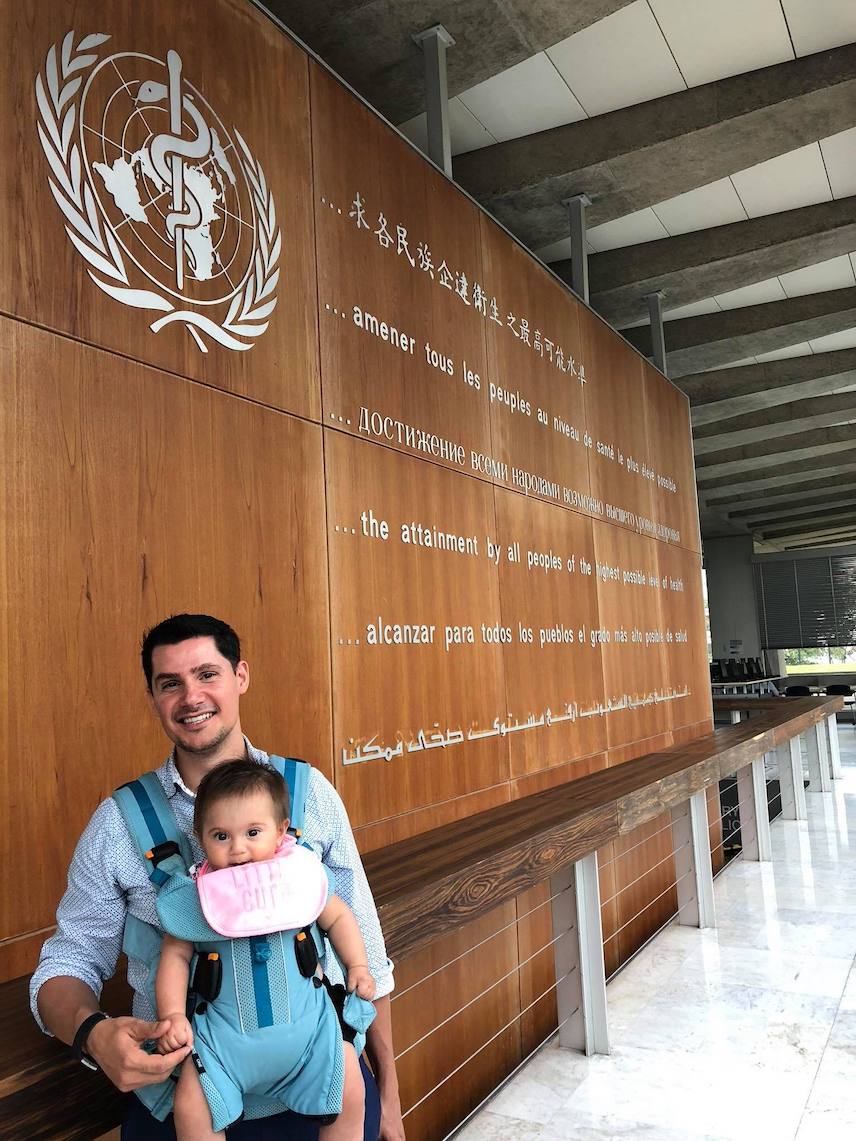
1. What is your specialty and where are you currently working?
I’m a family physician and have been working in the humanitarian and development sectors internationally ever since I finished my residency. I’ve recently relocated from Geneva to Vancouver, where I now spend half my time on a digital health initiative focused on expanding Universal Health Coverage (UHC) and accelerating the attainment of the health and health-related Sustainable Development Goals (SDG3+) around the world.
2. What made you decide to get involved in global health and what sort of initiatives/projects have you taken on?
I became involved in global health because I found the prospect of overcoming the challenges involved in providing care to vulnerable populations and learning from them incredibly fulfilling. I undertook most of my medical electives and public health research during medical school and residency abroad. Afterwards, I had the opportunity to work internationally with organizations such as the International Committee of the Red Cross (ICRC) and the World Health Organization (WHO), among others. Most recently, I was working at the WHO in Geneva as the Co-Founder and Co-Lead of the WHO Innovation Hub and also with the WHO Health Emergencies Programme.
3.How has your global health experience contributed to your career path/day-to-day work?
It has informed and enriched my career path every step of the way. I’ve witnessed people in the most harrowing circumstances overcome health challenges to create remarkable opportunities for themselves and their communities. I’ve also seen the opposite in places where health systems were fragile. The stark contrast drove me to think about how we can support people who are leading changes on the front lines in healthcare around the world to create systems that could leapfrog traditional models of care from the individual patient to population level.
4. What advice do you have for students interested in global health?
Realize that many of the issues affecting the health of people globally are ones that you can learn about, reflect upon and contribute to addressing locally. From climate change to resource limitations to difficulties in accessing healthcare, we’re surrounded by these global challenges. Still, if you have the opportunity to undertake course work, clinical electives or research – in a way that you can meaningfully contribute while simultaneously learning – in areas that are very different from where you study or plan to practice, I would say go for it. That exposure and immersion may open your eyes to new ways of doing things and inspire you to think more deeply about what you wish to accomplish through your medical career.
5. As we are hoping that the MDs of Global Health national initiative will inspire medical students across the country to become involved in global health, would you like students to be able to contact you if they are interested in learning more about your experiences? If so, what would be the best way to get in contact with you?
Absolutely. Feel free to get in touch with me at [email protected].
-
Dr. Joanne Perry, Family Physician, Médecins Sans Frontières
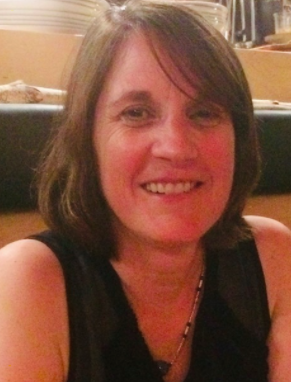
1. What is your specialty and where are you currently working?
I am a family physician in Ottawa for the past 28 years. I work 4 days per week at a community family practice and one day per week at the Ottawa Newcomer Clinic which provides care to recent refugees arriving to Canada. I worked part time emergency for several years during my career as well.
2. What made you decide to get involved in global health and what sort of initiatives/projects have you taken on?
I have travelled throughout the world since childhood, so I always had an interest in visiting other countries. It became apparent to me as I grew up how fortunate I was to live in Canada where I had access to clean water, education and health care. As I started my medical career, I realized I could use my skills and training to assist populations beyond Canada that had limited access to medical care.
When my children were younger, I worked with several small NGOs such as Remote Area Medicine, Canadian Medical Assistance Team which provided me opportunities to participate in shorter term trips of 3-4 weeks. I worked in projects in Guyana, Bolivia, Nepal and Kenya for several years. I was part of an emergency response team in Haiti after the earthquake in 2010.
Since Médecins Sans Frontières (MSF) won the Nobel prize in 1999, my dream was to work with them one day. Because this would involve a longer time commitment, I waited until my last child started university before applying.
I went to Chad with MSF for six months in 2015 and subsequently completed two additional assignments in Iraq and South Sudan. [This year], I will leave for 3 months to work in the Democratic Republic of Congo.
3.How has your global health experience contributed to your career path/day-to-day work?
Often when I return from overseas, my patients express their concerns must seem trivial now that I have worked in developing countries and often witnessed severe and preventable diseases and lack of access to more specialized care. On the contrary, I am grateful to work in a health care system that, by and large, is functioning well. I enjoy the continuity of care that working in the same practice for several years affords me; for example, caring for up to 4 generations of the same family.
Working in remote and low resource contexts has helped me “choose wisely” what tests and treatments will most benefit my patients here in Canada. My global health experience perspective also has made me realize that, universally, good health is a priority for all families and especially their children. There are situations working in very poor countries where there is little care to offer except our support and compassion and I have come to understand this is valued as much as modern drugs and equipment. When patients in my Ottawa practice are facing new diagnoses that have limited treatment options, I remind myself that being present and engaged is equally as valuable to this patient and their family.
4. What advice do you have for students interested in global health?
Travel to interesting countries all over the world to learn new cultures. On your elective choose to go to remote locations such as northern Canada. Become involved in your university global health associations. Follow world news and think of how your developing knowledge and skills might be able to contribute to making the world a more compassionate place.
5. As we are hoping that the MDs of Global Health national initiative will inspire medical students across the country to become involved in global health, would you like students to be able to contact you if they are interested in learning more about your experiences? If so, what would be the best way to get in contact with you?
I would be happy to share my experiences in more detail. Please contact by email: [email protected]
-
Dr. Sandy Buchman, President of the Canadian Medical Association
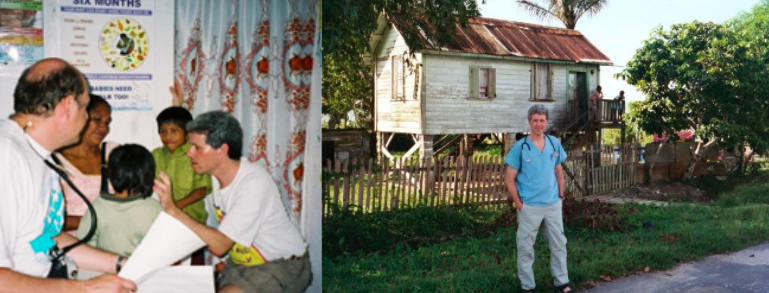
1. What is your specialty and where are you currently working?
- Freeman Chair in Palliative Care, North York General Hospital, Toronto
- Temmy Latner Centre for Palliative Care, Sinai Health System, Toronto (home based palliative care)
- Palliative Education and Care for the Homeless (PEACH) Program, Inner City Health Associates, Toronto
2. How would you define ‘global health’?
Global health is the health discipline which incorporates research, training and clinical practices to advocate for improvement in health for all, equitable access to healthcare, and action on the global threats to health and wellbeing irrespective of national boundaries and borders.
3. What made you decide to get involved in global health and what sort of initiatives/projects have you taken on?
I was introduced to Global Health when I encountered my first patient with AIDS in late 1984, early in the epidemic and before HIV was even identified. As I began to take on more and more patients with AIDS I began to examine and come to understand the social factors that were contributing to the epidemic. This led to further study and travel to South America and Africa to care for patients with HIV/AIDS (as well as others) as I was comfortable and confident in treating these patients in Canada. An example of an early initiative I took on was the development of an occupational risk protocol for needlestick injury and maternal-fetal transmission in my community.
4. How has your global health experience contributed to your career path/day-to-day work?
As I worked to understand the social factors (later identified as the social determinants of health) contributing to the increasing rates of HIV infection amongst those more vulnerable and marginalized, I began to question the social responsibility and social accountability that the medical profession has to contribute back to the society that has given physicians the privilege of studying and practicing medicine, especially with regard to the more vulnerable and marginalized patients.
This led to leadership within the profession including bringing this ethos as president of the College of Family Physicians of Canada and now as president of the Canadian Medical Association. I have been a major supporter of Global health at the CFPC. It also led to publications within the field of advocacy and social accountability of medicine. In addition, it directed me to work with the more vulnerable and marginalized in the area of my discipline, palliative care, by providing palliative care to the homeless on the streets, in the shelters, supportive housing and in a new hospice for the homeless in my community.
5. What advice do you have for medical students interested in global health?
I would advise medical students to pursue their passion for global health and become involved in organizations that support global health initiatives and take advantage of elective opportunities to gain experience in different settings and in different disciplines. It also means that one does not have to venture overseas to gain this experience as global health includes addressing and advocating for improvement in healthcare and equitable access to care right here in Canada, including remote and rural Canada and the care of our indigenous populations.
6. As we are hoping that the MDs of Global Health national initiative will inspire medical students across the country to become involved in global health, would you like students to be able to contact you if they are interested in learning more about your experiences? If so, what would be the best way to get in contact with you?
-
Dr. Gigi Osler, Past President of the Canadian Medical Association
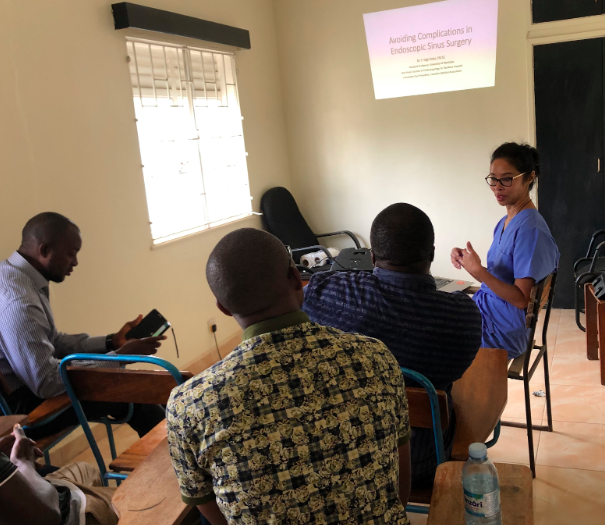
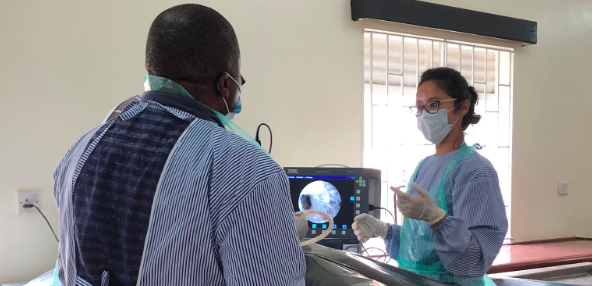
1. What is your specialty and where are you currently working?
Otolaryngology-Head and Neck Surgery (also known as ENT Surgery). I am currently working in Winnipeg, Canada and doing annual volunteer work in Mbarara, Uganda.
2. What made you decide to get involved in global health and what sort of initiatives/projects have you taken on?
I have always had an interest in global health and got involved at a point in my career when I could dedicate more time to working abroad. At present I volunteer for two to three weeks annually in Mbarara, Uganda. Working with other surgeons from Canada and around the world, we partner with local ENT surgeons to expand their clinical capacity to provide care to their local population. Our work has shifted from service delivery to building the surgical capacity – the human health resources – of the ENT surgeons.
3. How has your global health experience contributed to your career path/day-to-day work?
As a visiting surgeon to low-income countries, seeing the health inequities and disparities in access to care makes me appreciate our healthcare system. My global health work inspires me to work harder to improve our healthcare system for both patients and doctors.
4. What advice do you have for students interested in global health?
Good intentions are not enough. In global health, one must be aware of the cultural, moral and ethical considerations within the region and country where you will be working. Consider the work that you will be doing – will it be sustainable after you have left? Are you following the same standards that you would follow in your home country? Have you made respectful and mutually beneficial relationships, built on trust, with the in-country health care professionals? How will your work benefit the patients, health professionals, and the healthcare system?
-
Dr. Peter Daley, Infectious Diseases Physician and Medical Microbiologist at MUN
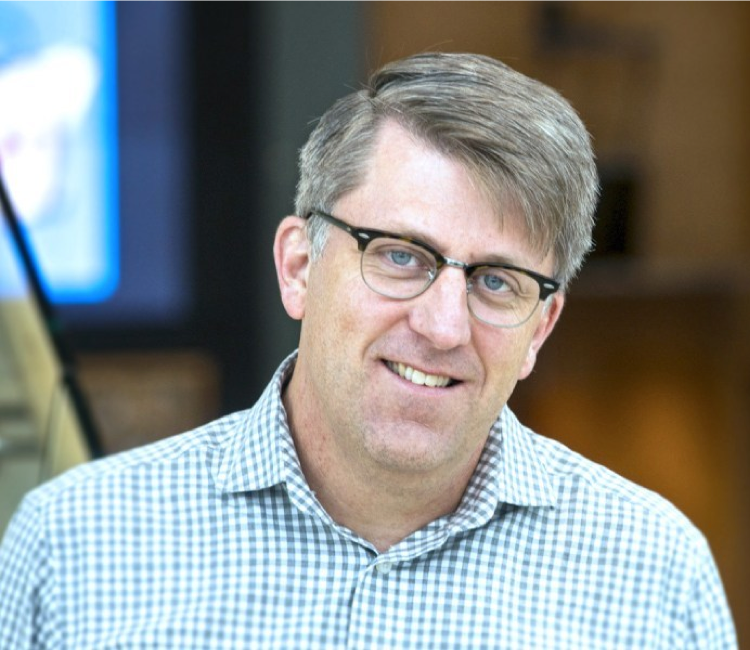
1. What is your specialty and where are you currently working?
My specialty is infectious diseases and medical microbiology and I am an Associate Professor of Medicine at Memorial University of Newfoundland.
2. What made you decide to get involved in global health and what sort of initiatives/projects have you taken on?
I decided early in medical residency that I wanted to work in developing countries and study infectious diseases. I went to Nepal on a medical student elective, which influenced me deeply. After residency, I joined a Christian missionary organization and worked in India for 3 years. I worked in a large teaching hospital called Christian Medical College Vellore and did research in tuberculosis diagnosis and treatment. I published a large randomized controlled trial of adjunctive vitamin D for tuberculosis treatment.
3. How has your global health experience contributed to your career path/day-to-day work?
I returned to Canada for family reasons and found an academic position, where I continue to do clinical and research work in infectious diseases.
4. What advice do you have for students interested in global health?
Take one or more student or resident electives in order to assess your interest and aptitude for living in a developing country, since it is challenging. Connect with an organization that is working in global health, to seek a funding model that can sustain you. Start with a project that you can feasibly complete.
5. As we are hoping that the MDs of Global Health national initiative will inspire medical students across the country to become involved in global health, would you like students to be able to contact you if they are interested in learning more about your experiences? If so, what would be the best way to get in contact with you?
You can email me at [email protected].

